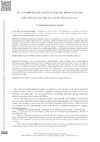Please use this identifier to cite or link to this item:
https://accedacris.ulpgc.es/jspui/handle/10553/114154
| Title: | El alzamiento de los esclavos de México en 1612 | Other Titles: | The uprising of the slaves of Mexico in 1612 | Authors: | Bruquetas de Castro, Fernando | UNESCO Clasification: | 550404-1 Historia moderna. Área americana 510304 Esclavitud y servidumbre |
Keywords: | Esclavos México Consejo de Indias Alzados Monarquía, et al |
Issue Date: | 2021 | Publisher: | Cabildo Insular de Gran Canaria | Conference: | XXIV Coloquio de Historia Canario-Americana | Abstract: | La Biblioteca Nacional de España conserva el manuscrito en el que se recoge el informe remitido al presidente del Consejo de Indias don Luis de Velasco, donde se comunican los planes de rebelión que había preparado una parte de los esclavos de la ciudad de México, quienes tenían la intención de matar a todos los españoles, y de instituir una nueva monarquía de negros en Nueva España. El documento revela una serie de detalles sobre distintos aspectos de la capital, lo que contribuye a comprender el desarrollo de la urbe. Uno de los hechos más llamativos del manuscrito es la parte que se refiere a la desecación de la laguna mexicana, que se produjo en esas fechas; ya que ahí se encuentra el posible origen de la revuelta esclavista, al reunir –para poder llevarla a cabo con éxito– una numerosa mano de obra esclava, sin arraigo en la región mexicana. The National Library of Spain preserves the manuscript in which the report sent to the president of the Council of the Indies Don Luis de Velasco is collected, where the rebellion plans that a part of the slaves of Mexico City had prepared, who had the intention to kill all Spaniards, and to institute a new black monarchy in New Spain. The document reveals a series of details about different aspects of the capital, which contributes to understanding the development of the city. One of the most striking facts of the manuscript is the part that refers to the drying up of the Mexican lagoon, which occurred at that time; since that is where the possible origin of the slave revolt is found, by gathering - in order to carry it out successfully - a large slave labor force, without roots in the Mexican region. |
URI: | https://accedacris.ulpgc.es/handle/10553/114154 | ISSN: | 2386-6837 | Source: | XXIV Coloquio de Historia Canario-Americana [ISSN 2386-6837] |
| Appears in Collections: | Actas de congresos |
Page view(s)
46
checked on Jan 10, 2026
Download(s)
14
checked on Jan 10, 2026
Google ScholarTM
Check
Share
Export metadata
Items in accedaCRIS are protected by copyright, with all rights reserved, unless otherwise indicated.
